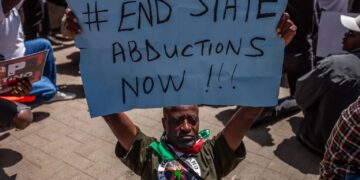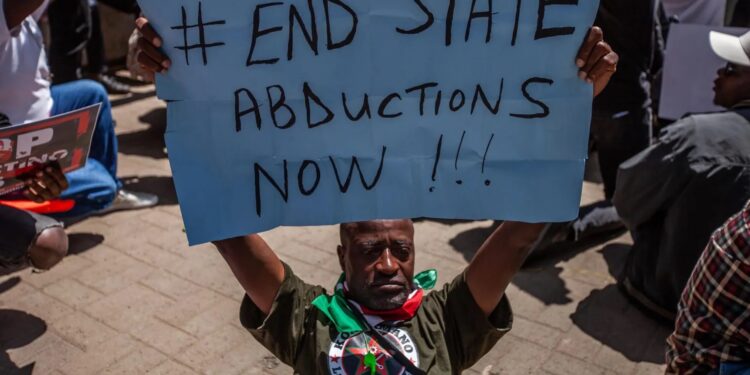Five young men in Kenya who vanished just before Christmas have been found alive, according to families and human rights groups.
Kenya has been grappling with a surge in disappearances, with over 80 cases reported in the past six months, according to a state-funded rights group.
These abductions, largely believed to be carried out by security personnel, appear to target critics of the government, though authorities have not admitted involvement.
The wave began during anti-tax protests in June last year and intensified in December after AI-generated images of President William Ruto in a coffin circulated widely.
Youth-led demonstrations forced the president to shelve plans for new tax hikes, significantly weakening his administration’s authority.
One of those freed, 24-year-old student Billy Mwangi, was discovered in Embu, within the Mount Kenya region.
Speaking to reporters, local MP Gitonga Mukunji revealed Mwangi had been subjected to beatings and whipping while detained in darkness, leaving him deeply shaken.
Mwangi’s father said his son was too distressed to discuss his experience but had been taken to the hospital for care.
“He came home at around eight in the morning, walking by himself. His mother and I saw him and are thankful to everyone who prayed for him,” he told The Daily Nation.
Last week, Mwangi’s father broke down during a court hearing as he pleaded for his son’s release.
A relative of another abductee, 22-year-old Peter Muteti, told the BBC on Monday that he had been reunited with his family but remained disoriented and unable to speak about his ordeal.
Amnesty International Kenya praised the releases and called on authorities to free all those still detained and hold perpetrators accountable.
Two weeks ago, police denied involvement in the abductions, which were carried out by plainclothes men, some caught on CCTV.
On Monday, authorities acknowledged the release of some individuals and confirmed they were already in touch with one abductee who had turned up at a police station.
Police said investigations into the numerous disappearances are ongoing.
Rights advocates and citizens have linked the kidnappings to an intelligence and counter-terrorism unit operating within Kenya’s security forces.
Amid public outrage, President Ruto stated last month, “We are going to stop the abductions so that our youth can live peacefully and have discipline,” urging parents to be vigilant in monitoring their children.
Until Monday, no one had been freed since Ruto’s remarks on December 27, with activists preparing to stage protests to pressure the government into taking action.
Families of two other men, Ronny Kiplangat and Bernard Kavuli, confirmed their release to local media.
Kavuli, a content creator, was abducted on Nairobi’s outskirts in December, while Kiplangat is the brother of satirical cartoonist Kibet Bull, who also disappeared last month.
Kibet Bull, known for his memes criticizing the president, was among those taken after sharing AI-generated images of Ruto.
On Monday afternoon, Bull announced his release on X, where he was greeted with widespread support.
He told his 105,000 followers that he had been dropped off in Luanda, roughly 370 kilometers (229 miles) from where he was last seen in Nairobi.
Bull’s family confirmed his safe return through local advocacy group Vocal Africa.
Despite the recent releases, at least 24 people remain unaccounted for.
Police said Kavuli had voluntarily come forward at a police station in Moi’s Bridge, western Kenya, and was assisting them with their investigations.
Authorities added they would provide support to those freed and their families as they continue efforts to gather further information for the ongoing probes.
The Law Society of Kenya has filed a legal suit demanding the immediate and unconditional release of seven individuals abducted last month, including some who have now been freed.
The situation remains tense, with parents expressing deep concern over their children’s safety as activists vow to keep up the pressure until all missing persons are found.


































